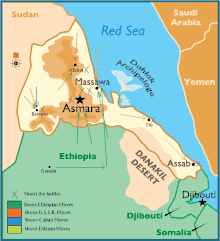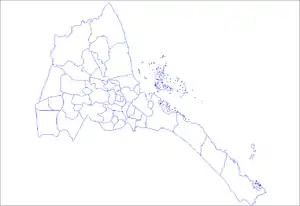The Eritrea Portal
Eritrea (/ˌɛrɪˈtriːə/ ⓘ ERR-ih-TREE-ə or /-ˈtreɪ-/ -TRAY-; Tigrinya: ኤርትራ, romanized: Ertra, pronounced [ʔer(ɨ)trä] ⓘ, officially the State of Eritrea is a country in the Horn of Africa region of Eastern Africa, with its capital and largest city at Asmara. It is bordered by Ethiopia in the south, Sudan in the west, and Djibouti in the southeast. The northeastern and eastern parts of Eritrea have an extensive coastline along the Red Sea. The nation has a total area of approximately 117,600 km2 (45,406 sq mi), and includes the Dahlak Archipelago and several of the Hanish Islands. Human remains found in Eritrea have been dated to 1 million years old and anthropological research indicates that the area may contain significant records related to the evolution of humans. The Kingdom of Aksum, covering much of modern-day Eritrea and northern Ethiopia, was established during the first or second century AD. It adopted Christianity around the middle of the fourth century. Beginning in the 12th century, the Ethiopian Zagwe and Solomonid dynasties held sway to a fluctuating extent over the entire plateau and the Red Sea coast. Eritrea's central highlands, known as Midri-Bahri ("Land of the Sea"), were the northern frontier region of the Ethiopian kingdoms and were ruled by a governor titled the Bahr Negash ("lord of the sea"). In the 16th century, the Ottomans occupied the Eritrean coastline. Beginning in 1882–1885, Italian troops systematically spread out from Massawa toward the highland, eventually resulting in the formation of the colony of Italian Eritrea in 1889. After World War II, Eritrea was administered by the British Military Administration until 1952. Following the UN General Assembly decision in 1952, Eritrea would govern itself with a local Eritrean parliament, but for foreign affairs and defense, it would enter into a federal status with Ethiopia for ten years. However, in 1962, the government of Ethiopia annulled the Eritrean parliament and formally annexed Eritrea. The Eritrean secessionist movement organised the Eritrean Liberation Front in 1961 and fought the Eritrean War of Independence until Eritrea gained de facto independence in 1991. Eritrea gained de jure independence in 1993 after an independence referendum. Contemporary Eritrea is a multi-ethnic country with nine recognised ethnic groups. Nine different languages are spoken by the nine recognised ethnic groups, the most widely spoken language being Tigrinya, the others being Tigre, Saho, Kunama, Nara, Afar, Beja, Bilen and Arabic. Tigrinya, Arabic, and English serve as the three working languages. Most residents speak languages from the Afroasiatic family, either of the Ethiopian Semitic languages or Cushitic branches. Among these communities, the Tigrinyas make up about 50% of the population, with the Tigre people constituting around 30% of inhabitants. In addition, there are several Nilo-Saharan-speaking Nilotic ethnic groups. Most people in the country adhere to Christianity or Islam, with a small minority adhering to traditional faiths. (Full article...) Selected article -Injera (Amharic: እንጀራ, romanized: ənǧära, [ɨndʒəra]; Oromo: Biddeena; Tigrinya: እንጀራ and ጣይታ, romanized: ənǧära and ṭayta) is a sour fermented pancake-like flatbread with a slightly spongy texture, traditionally made of teff flour. In Ethiopia, Eritrea, and some parts of Sudan and Kenya, injera is a staple. Injera is central to the dining process, like bread or rice elsewhere and is usually stored in the mesob. (Full article...)Selected picture -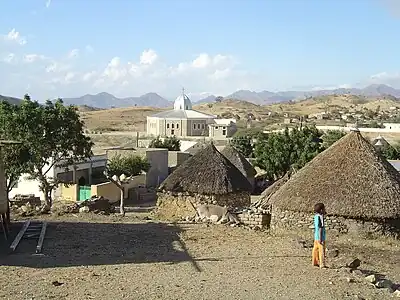 Did you know -
CategoriesCategory puzzle Select [►] to view subcategories
Eritrea Eritrea-related lists Eritrean culture Economy of Eritrea Education in Eritrea Environment of Eritrea Geography of Eritrea Government of Eritrea Health in Eritrea History of Eritrea Organisations based in Eritrea Eritrean people Politics of Eritrea Society of Eritrea Eritrea stubs Related portalsWikiProjects
General images - Topics in EritreaSelected panorama -Associated WikimediaThe following Wikimedia Foundation sister projects provide more on this subject:
SourcesDiscover Wikipedia using portals
| |||||
.svg.png.webp)
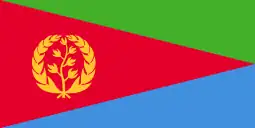
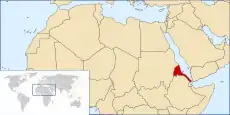
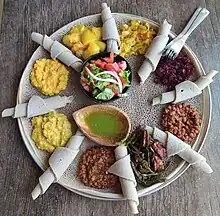
.jpg.webp)
.jpg.webp)


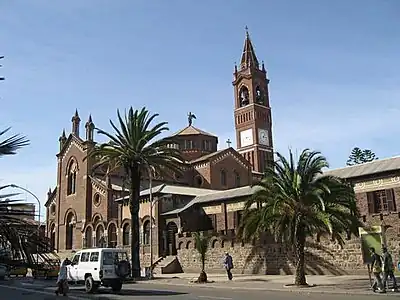
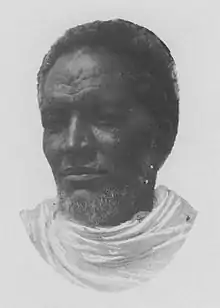
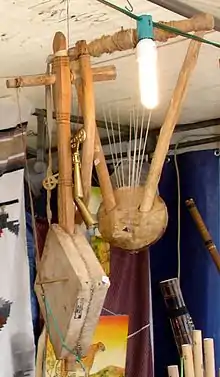
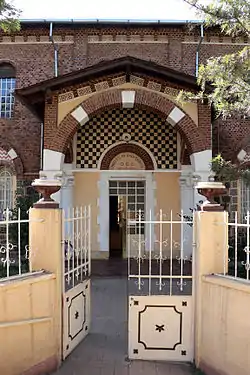
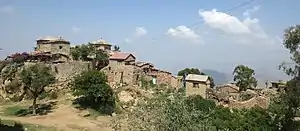
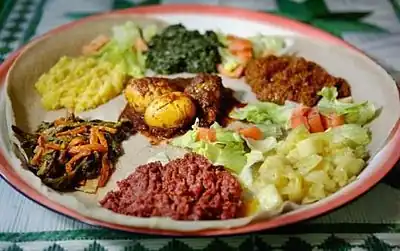
_crowned.svg.png.webp)

.jpg.webp)
